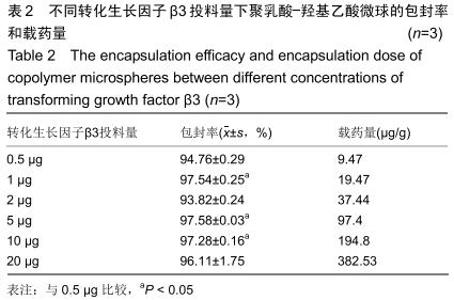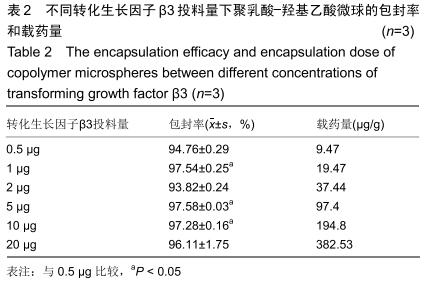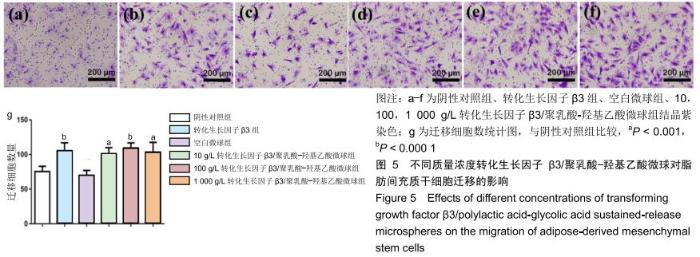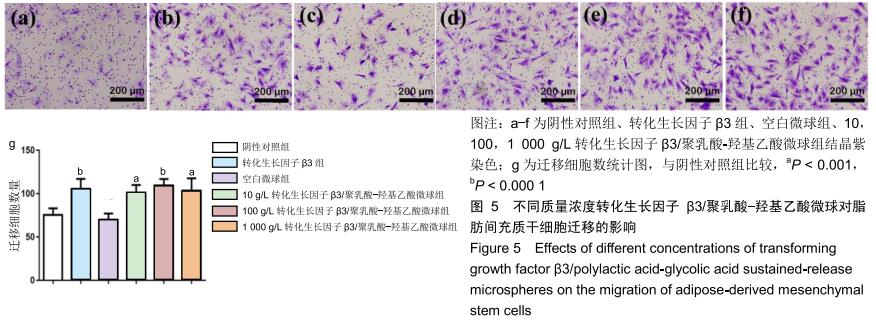Chinese Journal of Tissue Engineering Research ›› 2020, Vol. 24 ›› Issue (28): 4540-4546.doi: 10.3969/j.issn.2095-4344.2296
Previous Articles Next Articles
Regulation of stem cells by transforming growth factor β3/polylactic acid-glycolic acid microspheres
Yang Zhen1,2, Li Hao1,2, Gao Cangjian1,2, Fu Liwei1,2, Tian Guangzhao1,2, Zha Kangkang1,2, Sun Zhiqiang1,2, Li Xu2, Guo Weimin2, Sui Xiang2, Huang Jingxiang2, Liu Shuyun2, Lu Shibi2, Guo Quanyi2
1Medical College of Nankai University, Tianjin 300071, China; 2Institute of Orthopedics, Chinese PLA General Hospital, Beijing Key Laboratory of Regenerative Medicine in Orthopedics, Key Laboratory of Musculoskeletal Trauma & War Injuries, PLA, Beijing 100853, China
-
Received:2019-11-12Revised:2019-11-16Accepted:2019-12-20Online:2020-10-08Published:2020-09-01 -
Contact:Guo Quanyi, Professor, Institute of Orthopedics, Chinese PLA General Hospital, Beijing Key Laboratory of Regenerative Medicine in Orthopedics, Key Laboratory of Musculoskeletal Trauma & War Injuries, PLA, Beijing 100853, China -
About author:Yang Zhen, Master candidate, Medical College of Nankai University, Tianjin 300071, China; Institute of Orthopedics, Chinese PLA General Hospital, Beijing Key Laboratory of Regenerative Medicine in Orthopedics, Key Laboratory of Musculoskeletal Trauma & War Injuries, PLA, Beijing 100853, China -
Supported by:the National Key Research and Development Plan Project, No. 2019YFA0110600; the National Natural Science Foundation of China, No. 81772319
CLC Number:
Cite this article
Yang Zhen, Li Hao, Gao Cangjian, Fu Liwei, Tian Guangzhao, Zha Kangkang, Sun Zhiqiang, Li Xu, Guo Weimin, Sui Xiang, Huang Jingxiang, Liu Shuyun, Lu Shibi, Guo Quanyi . Regulation of stem cells by transforming growth factor β3/polylactic acid-glycolic acid microspheres[J]. Chinese Journal of Tissue Engineering Research, 2020, 24(28): 4540-4546.
share this article
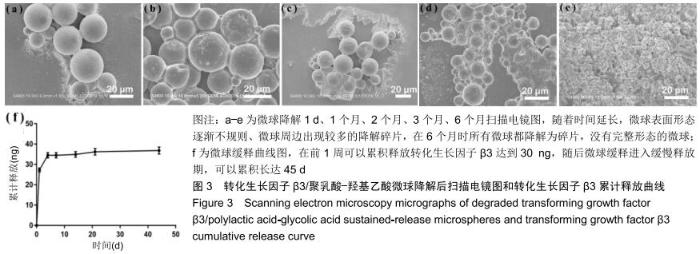
2.4 转化生长因子β3/PLGA微球的体外释放与降解特性 降解1 d后,微球表面光滑,无粘连,见图3a。降解1个月后,微球表面开始呈现小坑洞,这是由于PLGA微球表面的药物纳米液滴水相立即溶解在PBS溶液中导致的,见图3b。降解3个月后,微球形态更加不规则,开始出现粘连,且微球周边开始出现降解后碎片,见图3c。这种情况在降解3个月后更加明显,微球之间出现明显粘连,微球形态更加不规则,见图3d。在降解6个月后,所有微球都降解为碎片,隐约可见微球轮廓,见图3e。如图3f所示,在前1周内转化生长因子β3/PLGA微球突释累积释放达到 30 ng,随后微球缓释进入缓慢线性释放期,可缓慢释放长达45 d。 "
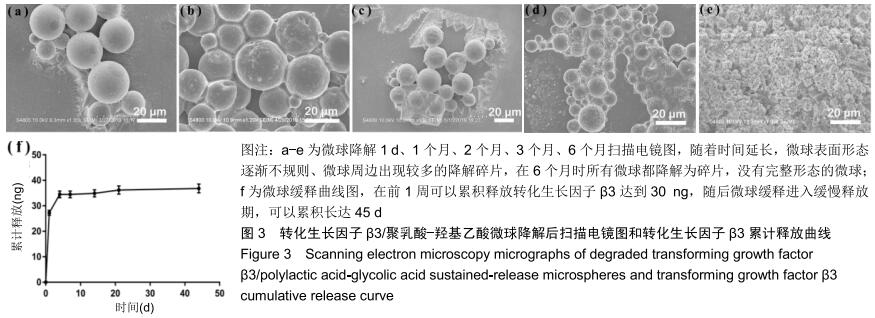
|
[1] MORILLE M, TOUPET K, MONTERO-MENEI CN, et al. PLGA-based microcarriers induce mesenchymal stem cell chondrogenesis and stimulate cartilage repair in osteoarthritis. Biomaterials. 2016;88:60-69.
[2] BUCKWALTER JA, MANKIN HJ. Articular cartilage: degeneration and osteoarthritis, repair, regeneration, and transplantation.Instr Course Lect.1998;47:487-504.
[3] CHEN D, SHEN J, ZHAO W, et al. Osteoarthritis: toward a comprehensive understanding of pathological mechanism. Bone Res.2017;5:16044.
[4] VAN OSCH GJ, BRITTBERG M, DENNIS JE, et al. Cartilage repair: past and future–lessons for regenerative medicine. J Cell Mol Med.2009;13(5):792-810.
[5] WANG J, SUN B, TIAN L, et al. Evaluation of the potential of rhTGF-β3 encapsulated P (LLA-CL)/collagen nanofibers for tracheal cartilage regeneration using mesenchymal stems cells derived from Wharton's jelly of human umbilical cord. Mater Sci Eng C.2017;70:637-645.
[6] CHEN H, SUN J, WANG Z, et al. Magnetic Cell–Scaffold Interface Constructed by Superparamagnetic IONP Enhanced Osteogenesis of Adipose-Derived Stem Cells. ACS Appl Mater Interfaces. 2018;10(51):44279-44289.
[7] JING H, GAO B, GAO M, et al. Restoring tracheal defects in a rabbit model with tissue engineered patches based on TGF-β3-encapsulating electrospun poly (l-lactic acid-co-ε-caprolactone)/collagen scaffolds. Artif Cell Nanomed Biotechnol.2018;46(sup1):985-995.
[8] YANG Q, TENG BH, WANG LN, et al. Silk fibroin/cartilage extracellular matrix scaffolds with sequential delivery of TGF-β3 for chondrogenic differentiation of adipose-derived stem cells. Int J Nanomed. 2017; 12: 6721.
[9] LEE CH, COOK JL, MENDELSON A,et al.Regeneration of the articular surface of the rabbit synovial joint by cell homing: a proof of concept study.Lancet.2010; 376(9739): 440-448.
[10] LIANG C, LI H, TAO Y, et al. Dual release of dexamethasone and TGF-β3 from polymeric microspheres for stem cell matrix accumulation in a rat disc degeneration model. Acta Biomater. 2013; 9(12): 9423-9433.
[11] DORMER NH, GUPTA V, SCURTO AM, et al. Effect of different sintering methods on bioactivity and release of proteins from PLGA microspheres.Mater Sci Eng C. 2013; 33(7):4343-4351.
[12] PARK JS, PARK K, WOO DG, et al. PLGA microsphere construct coated with TGF-β 3 loaded nanoparticles for neocartilage formation. Biomacromolecules.2008; 9(8): 2162-2169.
[13] ALI M, WALBOOMERS XF, JANSEN JA, et al. Influence of formulation parameters on encapsulation of doxycycline in PLGA microspheres prepared by double emulsion technique for the treatment of periodontitis. J Drug Deliv Sci Technol. 2019; 52: 263-271.
[14] FANG Y, ZHANG N, LI Q, et al. Characterizing the release mechanism of donepezil-loaded PLGA microspheres in vitro and in vivo.J Drug Deliv Sci Technol. 2019; 51: 430-437.
[15] HAMEED A, GALLAGHER L B, DOLAN E, et al. Insulin-like growth factor-1 (IGF-1) poly (lactic-co-glycolic acid)(PLGA) microparticles–development, characterisation, and in vitro assessment of bioactivity for cardiac applications. J Microencapsul.2019;36(3):267-277.
[16] WANG J, SUN X, ZHANG Z,et al.Silk fibroin/ collagen/hyaluronic acid scaffold incorporating pilose antler polypeptides microspheres for cartilage tissue engineering. Mater Sci Eng C.2019;94:35-44.
[17] CHENG H, ZHANG Y, ZHANG B, et al. Biocompatibility of polypropylene mesh scaffold with adipose-derived stem cells.Exp Ther Med. 2017;13(6): 2922-2926.
[18] 韩爽,卢世璧,刘强,等.自体脂肪间充质干细胞复合人脐带Wharton胶支架修复兔膝关节软骨缺损[J].中国组织工程研究, 2012,16(19):3496-3501.
[19] GOLDRING MB, TSUCHIMOCHI K,IJIRI K. The control of chondrogenesis. J Cell Biochem. 2006; 97(1): 33-44.
[20] CLEARY MA, VAN OSCH GJ, BRAMA PA, et al. FGF, TGFβ and Wnt crosstalk: embryonic to in vitro cartilage development from mesenchymal stem cells. J Tissue Eng Regen Med. 2015; 9(4): 332-342.
[21] GREEN JD, TOLLEMAR V, DOUGHERTY M, et al. Multifaceted signaling regulators of chondrogenesis: implications in cartilage regeneration and tissue engineering. Genes Dis. 2015;2(4):307-327.
[22] SEYEDIN SM, THOMAS TC, THOMPSON AY, et al. Purification and characterization of two cartilage-inducing factors from bovine demineralized bone.Proc Natl Acad Sci U S A. 1985;82(8):2267-2271.
[23] HEINE UL, MUNOZ EF, FLANDERS KC, et al. Role of transforming growth factor-beta in the development of the mouse embryo.J Cell Biol.1987; 105(6):2861-2876.
[24] ROSEN DM, STEMPIEN SA, THOMPSON AY, et al. Differentiation of rat mesenchymal cells by cartilage-inducing factor: Enhanced phenotypic expression by dihydrocytochalasin B. Exp Cell Res.1986; 165(1): 127-138.
[25] ALMEIDA HV, ESWARAMOORTHY R, CUNNIFFE GM, et al. Fibrin hydrogels functionalized with cartilage extracellular matrix and incorporating freshly isolated stromal cells as an injectable for cartilage regeneration. Acta Biomater.2016;36: 55-62.
[26] BIAN L, ZHAI DY, TOUS E, et al. Enhanced MSC chondrogenesis following delivery of TGF-β3 from alginate microspheres within hyaluronic acid hydrogels in vitro and in vivo. Biomaterials. 2011; 32(27): 6425-6434.
[27] WEISS S, HENNIG T, BOCK R, et al. Impact of growth factors and PTHrP on early and late chondrogenic differentiation of human mesenchymal stem cells.J Cell Physiol.2010; 223(1): 84-93.
[28] MARTINS C, SOUSA F, ARAUJO F, et al. Functionalizing PLGA and PLGA derivatives for drug delivery and tissue regeneration applications. Adv Healthc Mater.2018; 7(1): 1701035.
[29] MIR M, AHMED N, REHMAN AU. Recent applications of PLGA based nanostructures in drug delivery.Colloids Surf B Biointerfaces. 2017; 159: 217-231.
[30] YAO S, LIU H, YU S, et al. Drug-nanoencapsulated PLGA microspheres prepared by emulsion electrospray with controlled release behavior.Regen Biomater.2016;3(5):309-317.
[31] DENG Y, SUN AX, OVERHOLT KJ, et al. Enhancing chondrogenesis and mechanical strength retention in physiologically relevant hydrogels with incorporation of hyaluronic acid and direct loading of TGF-β. Acta Biomater. 2019;83:167-176.
[32] ZHOU M, LOZANO N, WYCHOWANIEC JK, et al. Graphene oxide: a growth factor delivery carrier to enhance chondrogenic differentiation of human mesenchymal stem cells in 3D hydrogels.Acta Biomater.2019; 96: 271-280.
[33] SANCHO-TELLO M, FORRIOL F, MARTÍN DE LLANO JJ, et al. Biostable scaffolds of polyacrylate polymers implanted in the articular cartilage induce hyaline-like cartilage regeneration in rabbits.Int J Artif Organs.2017;40(7): 350-357.
[34] SUN X, WANG J, WANG Y, et al. Collagen-based porous scaffolds containing PLGA microspheres for controlled kartogenin release in cartilage tissue engineering. Artif Cell Nanomed Biotechnol.2018;46(8):1957-1966.
[35] LUO Z, JIANG L, XU Y, et al. Mechano growth factor (MGF) and transforming growth factor (TGF)-β3 functionalized silk scaffolds enhance articular hyaline cartilage regeneration in rabbit model. Biomaterials.2015;52:463-475. |
| [1] | Zhang Tongtong, Wang Zhonghua, Wen Jie, Song Yuxin, Liu Lin. Application of three-dimensional printing model in surgical resection and reconstruction of cervical tumor [J]. Chinese Journal of Tissue Engineering Research, 2021, 25(9): 1335-1339. |
| [2] | Li Cai, Zhao Ting, Tan Ge, Zheng Yulin, Zhang Ruonan, Wu Yan, Tang Junming. Platelet-derived growth factor-BB promotes proliferation, differentiation and migration of skeletal muscle myoblast [J]. Chinese Journal of Tissue Engineering Research, 2021, 25(7): 1050-1055. |
| [3] | Liu Cong, Liu Su. Molecular mechanism of miR-17-5p regulation of hypoxia inducible factor-1α mediated adipocyte differentiation and angiogenesis [J]. Chinese Journal of Tissue Engineering Research, 2021, 25(7): 1069-1074. |
| [4] | Wang Shiqi, Zhang Jinsheng. Effects of Chinese medicine on proliferation, differentiation and aging of bone marrow mesenchymal stem cells regulating ischemia-hypoxia microenvironment [J]. Chinese Journal of Tissue Engineering Research, 2021, 25(7): 1129-1134. |
| [5] | Zeng Yanhua, Hao Yanlei. In vitro culture and purification of Schwann cells: a systematic review [J]. Chinese Journal of Tissue Engineering Research, 2021, 25(7): 1135-1141. |
| [6] | Deng Zhenhan, Huang Yong, Xiao Lulu, Chen Yulin, Zhu Weimin, Lu Wei, Wang Daping. Role and application of bone morphogenetic proteins in articular cartilage regeneration [J]. Chinese Journal of Tissue Engineering Research, 2021, 25(5): 798-806. |
| [7] | Xu Dongzi, Zhang Ting, Ouyang Zhaolian. The global competitive situation of cardiac tissue engineering based on patent analysis [J]. Chinese Journal of Tissue Engineering Research, 2021, 25(5): 807-812. |
| [8] | Ma Zetao, Zeng Hui, Wang Deli, Weng Jian, Feng Song. MicroRNA-138-5p regulates chondrocyte proliferation and autophagy [J]. Chinese Journal of Tissue Engineering Research, 2021, 25(5): 674-678. |
| [9] | Wang Yujiao, Liu Dan, Sun Song, Sun Yong. Biphasic calcium phosphate loaded with advanced platelet rich fibrin can promote the activity of rabbit bone marrow mesenchymal stem cells [J]. Chinese Journal of Tissue Engineering Research, 2021, 25(4): 504-509. |
| [10] | Zhou Jihui, Yao Meng, Wang Yansong, Li Xinzhi, Zhou You, Huang Wei, Chen Wenyao. Influence of novel nanoscaffolds on biological behaviors of neural stem cells and the related gene expression [J]. Chinese Journal of Tissue Engineering Research, 2021, 25(4): 532-536. |
| [11] | Wu Zijian, Hu Zhaoduan, Xie Youqiong, Wang Feng, Li Jia, Li Bocun, Cai Guowei, Peng Rui. Three-dimensional printing technology and bone tissue engineering research: literature metrology and visual analysis of research hotspots [J]. Chinese Journal of Tissue Engineering Research, 2021, 25(4): 564-569. |
| [12] | Chang Wenliao, Zhao Jie, Sun Xiaoliang, Wang Kun, Wu Guofeng, Zhou Jian, Li Shuxiang, Sun Han. Material selection, theoretical design and biomimetic function of artificial periosteum [J]. Chinese Journal of Tissue Engineering Research, 2021, 25(4): 600-606. |
| [13] | Liu Fei, Cui Yutao, Liu He. Advantages and problems of local antibiotic delivery system in the treatment of osteomyelitis [J]. Chinese Journal of Tissue Engineering Research, 2021, 25(4): 614-620. |
| [14] | Li Xiaozhuang, Duan Hao, Wang Weizhou, Tang Zhihong, Wang Yanghao, He Fei. Application of bone tissue engineering materials in the treatment of bone defect diseases in vivo [J]. Chinese Journal of Tissue Engineering Research, 2021, 25(4): 626-631. |
| [15] | Zhang Zhenkun, Li Zhe, Li Ya, Wang Yingying, Wang Yaping, Zhou Xinkui, Ma Shanshan, Guan Fangxia. Application of alginate based hydrogels/dressings in wound healing: sustained, dynamic and sequential release [J]. Chinese Journal of Tissue Engineering Research, 2021, 25(4): 638-643. |
| Viewed | ||||||
|
Full text |
|
|||||
|
Abstract |
|
|||||




